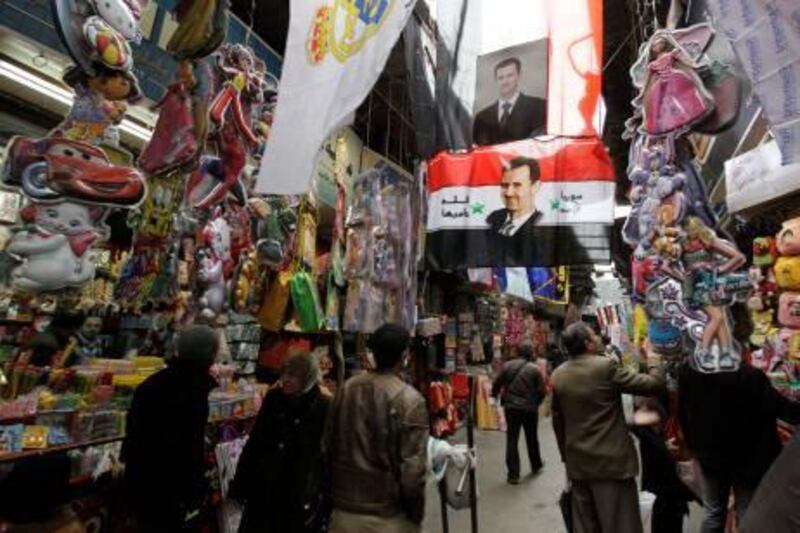DAMASCUS // It had been billed on Facebook and Twitter as Syria's own "Day of Anger", when the masses would rise up as they had in Tunisia and Egypt. Yet, in the persistent rain soaking Damascus on Friday, nothing happened.
Civil society activists in Syria have been mulling over why the protest fizzled. While all agree the pervasive security apparatus played a key role, there are also widespread complaints that, unlike the demonstrations in Cairo and Tunis, the one planned for Syria had no domestic roots.
"This call for a day of anger came from outside of the country, from people with no track record and that no one had heard of," said Mazen Darwich, a leading civil liberties campaigner. "It was a disaster, the organisers were less democratic than the security services."
He said those behind the Facebook campaign were overseas armchair revolutionaries, safely away from any repercussions of a failed revolt.
"They have no understanding of what happened in Egypt or Tunisia and they don't understand Syria," he said. "They think you can just say, 'Tomorrow will be the revolution' and it will happen."
The failure also laid bare the limitations of online organising in Syria. High-speed internet is available in the country, and many users bypass the clumsy censorship imposed on sites such as Facebook. But most Syrians are not online, especially the poor majority who would presumably form the core of any demonstrations.
"Facebook is used by young, educated middle-class Syrians who are not ready to actually be part of protests," said Abdul Karim Rehawee, head of the Syrian League for the Defence of Human Rights. "The internet, Facebook, Twitter, have no impact among the poor, those who are really struggling, it has no effect on the street."
Abu Hamid, a 50-year-old father of three, confirmed that assessment. A manual labourer who blames the government for his deepening poverty, he suggested he would have participated in a protest, if he had known one was taking place. He has never used the internet and had not heard of the Day of Anger.
"I'm old and have nothing to lose, if I'm put in jail for the next 20 years it doesn't matter," he said. "But most people don't think that, all of our mouths are zipped by fear of what happens if we speak out."
Syria has not seen public demonstrations by opposition groups since 2006, when protesters fruitlessly demanded an end to repressive emergency laws.
After the Cairo uprising, even small solidarity gatherings near the Egyptian Embassy in Damascus have been quashed.
In the run-up to the mooted protest on Friday, there had been speculation that Syria's disaffected Kurdish minority would play a key role. One civil liberties campaigner, speaking on condition of anonymity, said that had been another of the Facebook organisers' failings.
"They hoped the Kurds would be the spark that ignites the fire," he said. "Their theory was that Kurdish protesters would get beaten up in front of the media by the security forces and that this would start a popular uprising.
"The Kurds pay a high price for demonstrating, so they decided to wait and see. If the Arabs had protested, the Kurds would have joined, But everyone was doing the same thing, all waiting for someone else to make the first move. And no one moved."
Another factor, said some opposition activists, was that Syria's president, Bashar al Assad, is not unpopular. "People want a better economy, an end to corruption and more room to breathe but I think most do not want the president to go, they don't see that as the answer," said one critic of the regime. "We have no opposition, it hasn't been allowed to exist, and people see no alternatives to the president, so they are still hoping he pushes through reforms." Syria's security services remain on a heightened state of alert, according to civil society activists, and at least one campaigner, Ghassan al Najar, a 75-year-old Islamist, has been arrested after calling publicly for peaceful demonstrations.
But, having called for an uprising only to auspiciously fail in delivering one, political opposition groups in Syria have suffered a setback, said Mr Rehawee.
"They have actually damaged any chance of a demonstration taking place in future," he said. "After this, no one will believe it. If someone really does try to organise something, no one will turn up."
However, Mr Darwich believes Syria will undergo some kind of change in the wake of Tunisia and Egypt.
"I think the message has reached all levels that you cannot just keep going as you are," he said. "There is no way to keep controlling the people and the country in the same way. Change will happen.





